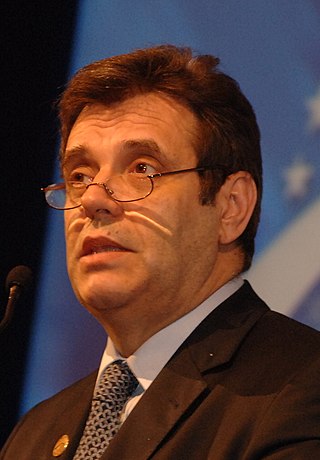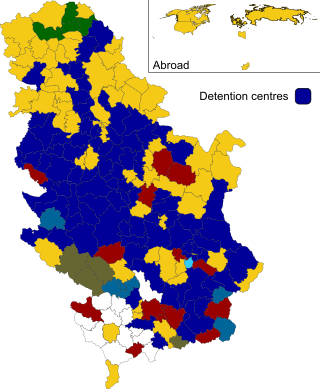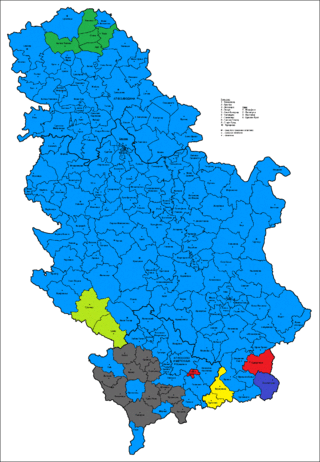
The Socialist Party of Serbia is a political party in Serbia. Ivica Dačić has led SPS as its president since 2006.
The New Democratic Party of Serbia, known as the Democratic Party of Serbia (DSS) until 2022, is a national-conservative political party in Serbia. Miloš Jovanović serves as the current president of NDSS.

Vojislav Koštunica is a Serbian former politician who served as the last president of FR Yugoslavia from 2000 to 2003 and as the prime minister of Serbia from 2004 to 2008.

The Democratic Party is a social democratic political party in Serbia. Zoran Lutovac has led the party as its president since 2018.

Boris Tadić is a Serbian politician who served as the president of Serbia from 2004 to 2012.
This article gives an overview of conservatism in Serbia. It is limited to conservative parties with substantial support, mainly proved by having had a representation in parliament. The sign ⇒ means a reference to another party in that scheme. For inclusion in this scheme it is not necessary so that parties labeled themselves as a conservative party.

Parliamentary elections were held in Serbia on 21 January 2007 to elect members of the National Assembly. The first session of the new National Assembly of the Republic of Serbia was held on 14 February 2007. The elections enabled the coalition of DS; DSS & G17+ to continue.
A constitutional referendum was held in Serbia on 28 and 29 October 2006, in which voters decided on adopting a new Constitution. The constitution is Serbia's first as an independent state since the Kingdom of Serbia's 1903 constitution. Over 6.6 million people were entitled to vote in the national referendum.
Provincial elections were held for the unicameral Assembly of Serbia's northern Autonomous Province of Vojvodina on 11 May 2008, with a second-round to be held on 25 May 2008. They were scheduled by the Speaker of the National Assembly of the Republic of Serbia Oliver Dulić on 29 December 2007, as required per the Constitutional Law adopted by the National Assembly of Serbia on 30 September 2006 that proclaimed the new Constitution.

For a European Serbia was a big tent and pro-EU electoral alliance, led by Boris Tadić, which participated in the 2008 Serbian parliamentary election. It received 38.42% of the popular vote, translating into 102 seats in the 250-seat Parliament of Serbia.

Second Government under Vojislav Koštunica as the Prime Minister was formed on 15 May 2007. After Serbian parliamentary election, 2008 this cabinet served as a transitional government handling only technical issues until the new government was formed on 7 July 2008.

The Democratic Movement of Serbia or DEPOS was a Serbian political coalition that existed between 1992 and 1994.

Parliamentary elections were held in Serbia on 6 May 2012 to elect members of the National Assembly. The elections were held simultaneously with provincial, local, and presidential elections.

Presidential elections were held in Serbia on 6 May 2012 alongside parliamentary elections. The elections were called following President Boris Tadić's early resignation in order to coincide with the parliamentary and local elections to be held on the same date. The Speaker of the Parliament, Slavica Đukić Dejanović, took over as the Acting President. As no candidate won a majority, a runoff was on 20 May, with incumbent Tadić facing Tomislav Nikolić of the Serbian Progressive Party.

Aleksandar Vučić – Serbia Must Not Stop, commonly shortened to just Serbia Must Not Stop, is the name of electoral lists led by the Serbian Progressive Party that contested the parliamentary, Vojvodina provincial, and local elections in December 2023.

Parliamentary elections were held in Serbia on 16 March 2014, with nineteen electoral lists competing for 250 members of the National Assembly. The election was called early, after tensions in the coalition led by the ruling Serbian Progressive Party (SNS) and Socialist Party of Serbia (SPS). President of Serbia Tomislav Nikolić scheduled the election at the same time as the previously announced Belgrade City Assembly election. Voter turnout was 53.09%, with 3.22% of votes invalid.

Parliamentary elections were held in Serbia on 24 April 2016. Initially, the election were originally due to be held by March 2018, but on 17 January 2016 Prime Minister Aleksandar Vučić called for a snap election claiming Serbia "needs four more years of stability so that it is ready to join the European Union". The elections were held simultaneously with provincial elections in Vojvodina and nationwide local elections.
The local election for the City Assembly of Belgrade, capital of Serbia, was held on 16 March 2014, alongside parliamentary election. The election was scheduled in late 2013, after the mayor Dragan Đilas lost a non-confidence motion in the assembly. Twenty-three parties and coalitions ran for 110 seats in the Assembly, with 5% election threshold required to win seats.
Andreja Mladenović is a Serbian politician and administrator. He was the deputy mayor of Belgrade from 2014 to 2018 and was an assistant to the mayor from 2018 to 2022. In August 2022, he was appointed as director of the Belgrade Metro.
Dragan Božić is a Serbian politician. He served in the Assembly of Vojvodina from 2004 to 2008 as a member of the Democratic Party of Serbia (DSS).


















